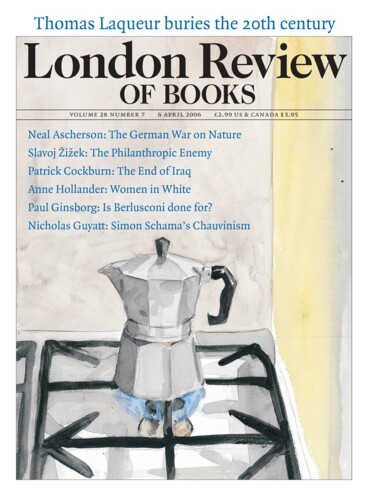On 16 March, the Independent Police Complaints Commission said that it ‘will not give a running commentary’ on the investigation into the conduct of the Metropolitan Police commissioner, Sir Ian Blair, after Jean Charles de Menezes was shot dead by police on a train at Stockwell Tube Station on the morning of 22 July 2005. The IPCC inquiry is being carried out in response to allegations made by the dead man’s family that Blair (and others in the Met) tried to mislead the public about the shooting. ‘We will be making our decision on facts and not speculation,’ the IPCC statement went on. ‘We have not reached any conclusions yet. We suggest others wait for our investigation and not jump to conclusions prematurely.’ The inquiry is expected to finish in April.
On 19 March, the Observer announced on its front page: ‘Top police “clear” Met chief over Menezes.’ In a long interview with the paper, Alan Given, the former second-in-command of Scotland Yard’s Central Operations unit, insisted that Blair didn’t realise the police had killed an innocent man until the following day – and no one else in the Met did, either. Given, who retired a few days before speaking to the Observer, was the ‘most senior officer directly responsible for the weapons team on duty that day’, so ought to know what he’s talking about. Perhaps, however, he ought not to have been giving newspaper interviews within days of the IPCC asking people to keep their mouths shut until the inquiry is finished.
The IPCC statement was a response to media coverage which, if not openly hostile towards Blair, at least tended to emphasise the evidence against him. On 9 March, for example, the Guardian reported that ‘witnesses who were inside Scotland Yard’s headquarters on 22 July have told the IPCC that on the day of the shooting planning and discussion took place based on the assumption that an innocent man had been killed.’ (Among those witnesses was Deputy Assistant Commissioner Brian Paddick. Scotland Yard issued a statement saying that Paddick’s testimony was untrue. Paddick consulted his libel lawyers.) Given’s remarks, and the prominence afforded them by the Observer, can therefore be seen as a way of restoring the balance of speculation. All the same, it’s a bit previous to be drawing conclusions based on the not uncontested evidence of a single witness.
Blair’s supporters have suggested that the commissioner is the ‘target of a witch-hunt’. It’s certainly true that he got on the wrong side of much of the press when he said in January that ‘almost nobody’ understood the reasons for the volume of coverage given to the murder of Holly Wells and Jessica Chapman. He was wrong to imply that it was surprising – on the contrary, it was all too predictable – but right to point out just how disproportionate it was, and right, too, that being white is one of the factors that make it more likely your murder will be news (others include being young, female, photogenic and having a name that’s short enough to fit across the front page of a tabloid newspaper). More recently, Blair’s been unfairly attacked for recording his own telephone conversations, which is neither illegal nor especially unusual: journalists do it all the time. On the other hand, his willingness to back the government on detaining terrorist suspects for 90 days is a significant blemish on his record as the progressive new face of the Met.
None of this, however, has any bearing on the IPCC inquiry. It’s not an investigation into Blair’s general fitness for his job. Its purpose is more narrowly to determine whether or not ‘individuals within the Metropolitan Police Service made false public statements following the fatal shooting’ of de Menezes. The word ‘false’ here must imply ‘dishonest’ as well as merely ‘not true’, since the police made a number of assertions that later turned out to be wrong: indeed they could reasonably be charged with making decisions based on speculation rather than fact – they speculated that de Menezes was a terrorist, for example, when in fact he was an innocent electrician. Once his innocence had been established, the police tried to justify their actions by claiming that de Menezes had jumped the ticket barrier and was wearing a heavy winter coat, which might have concealed a bomb: in fact he didn’t and he wasn’t – eyewitnesses had mistaken one of the police officers for the suspect. But we mustn’t jump to conclusions: whether these erroneous statements were prompted by dishonesty or incompetence is for the IPCC to decide.
Send Letters To:
The Editor
London Review of Books,
28 Little Russell Street
London, WC1A 2HN
letters@lrb.co.uk
Please include name, address, and a telephone number.

